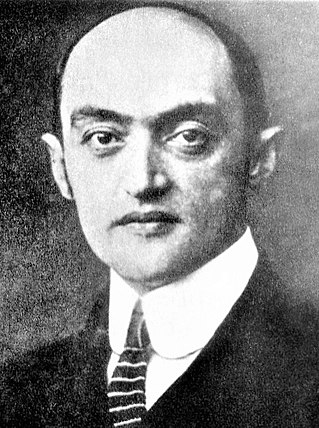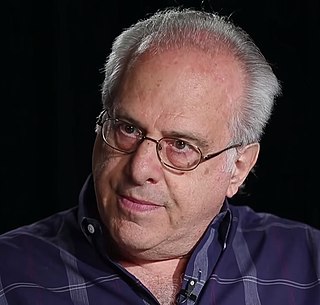Capitalism is an economic system based on the private ownership of the means of production, and their operation for profit. Central characteristics of capitalism include capital accumulation, competitive markets, price systems, private property, property rights recognition, voluntary exchange, and wage labor. In a market economy, decision-making and investments are determined by owners of wealth, property, or ability to maneuver capital or production ability in capital and financial markets—whereas prices and the distribution of goods and services are mainly determined by competition in goods and services markets.

Joseph Alois Schumpeter was an Austrian political economist. He served briefly as Finance Minister of Austria in 1919. In 1932, he emigrated to the United States to become a professor at Harvard University, where he remained until the end of his career, and in 1939 obtained American citizenship.
State capitalism is an economic system in which the state undertakes business and commercial economic activity and where the means of production are nationalized as state-owned enterprises. The definition can also include the state dominance of corporatized government agencies or of public companies in which the state has controlling shares.

Economic history is the study of history using methodological tools from economics or with a special attention to economic phenomena. Research is conducted using a combination of historical methods, statistical methods and the application of economic theory to historical situations and institutions. The field can encompass a wide variety of topics, including equality, finance, technology, labour, and business. It emphasizes historicizing the economy itself, analyzing it as a dynamic entity and attempting to provide insights into the way it is structured and conceived.
Private property is a legal designation for the ownership of property by non-governmental legal entities. Private property is distinguishable from public property, which is owned by a state entity, and from collective or cooperative property, which is owned by one or more non-governmental entities.
Productivism or growthism is the belief that measurable productivity and growth are the purpose of human organization, and that "more production is necessarily good". Critiques of productivism center primarily on the limits to growth posed by a finite planet and extend into discussions of human procreation, the work ethic, and even alternative energy production.
Islamic economics refers to the knowledge of economics or economic activities and processes in terms of Islamic principles and teachings. Islam has a set of special moral norms and values about individual and social economic behavior. Therefore, it has its own economic system, which is based on its philosophical views and is compatible with the Islamic organization of other aspects of human behavior: social and political systems.

Michael Albert is an American economist, speaker, writer, and political critic. Since the late 1970s, he has published books, articles, and other contributions on a wide array of subjects. He has also set up his own media outfits, magazines, and podcasts. He is known for helping to develop the socioeconomic theory of participatory economics.

An economic system, or economic order, is a system of production, resource allocation and distribution of goods and services within a society. It includes the combination of the various institutions, agencies, entities, decision-making processes, and patterns of consumption that comprise the economic structure of a given community.

Criticism of capitalism is a critique of political economy that involves the rejection of, or dissatisfaction with the economic system of capitalism and its outcomes. Criticisms typically range from expressing disagreement with particular aspects or outcomes of capitalism to rejecting the principles of the capitalist system in its entirety.

Hans-Werner Sinn is a German economist who served as President of the Ifo Institute for Economic Research from 1999 to 2016. He currently serves on the German economy ministry’s advisory council. He is Professor Emeritus of Economics and Public Finance at the University of Munich.

Richard David Wolff is an American Marxian economist known for his work on economic methodology and class analysis. He is a professor emeritus of economics at the University of Massachusetts Amherst and a visiting professor in the graduate program in international affairs of the New School. Wolff has also taught economics at Yale University, City University of New York, University of Utah, University of Paris I (Sorbonne), and The Brecht Forum in New York City.
Rentier capitalism is a concept in Marxist and heterodox economics to refer to rent-seeking and exploitation by companies in capitalist systems. A rentier is someone who earns income from capital without working. This is generally done through ownership of assets that generate yield, such as rental properties, shares in dividend paying companies, or bonds that pay interest.
Critique of political economy or simply the first critique of economy is a form of social critique that rejects the conventional ways of distributing resources. The critique also rejects what its advocates believe are unrealistic axioms, faulty historical assumptions, and taking conventional economic mechanisms as a given or as transhistorical. The critique asserts the conventional economy is merely one of many types of historically specific ways to distribute resources, which emerged along with modernity.
Production for use is a phrase referring to the principle of economic organization and production taken as a defining criterion for a socialist economy. It is held in contrast to production for profit. This criterion is used to distinguish communism from capitalism, and is one of the fundamental defining characteristics of communism.
Throughout modern history, a variety of perspectives on capitalism have evolved based on different schools of thought.
Social ownership is a type of property where an asset is recognized to be in the possession of society as a whole rather than individual members or groups within it. Social ownership of the means of production is the defining characteristic of a socialist economy, and can take the form of community ownership, state ownership, common ownership, employee ownership, cooperative ownership, and citizen ownership of equity. Within the context of socialist economics it refers particularly to the appropriation of the surplus product, produced by the means of production, or the wealth that comes from it, to society at large or the workers themselves. Traditionally, social ownership implied that capital and factor markets would cease to exist under the assumption that market exchanges within the production process would be made redundant if capital goods were owned and integrated by a single entity or network of entities representing society. However, the articulation of models of market socialism where factor markets are utilized for allocating capital goods between socially owned enterprises broadened the definition to include autonomous entities within a market economy.
Marxian economics, or the Marxian school of economics, is a heterodox school of political economic thought. Its foundations can be traced back to Karl Marx's critique of political economy. However, unlike critics of political economy, Marxian economists tend to accept the concept of the economy prima facie. Marxian economics comprises several different theories and includes multiple schools of thought, which are sometimes opposed to each other; in many cases Marxian analysis is used to complement, or to supplement, other economic approaches. Because one does not necessarily have to be politically Marxist to be economically Marxian, the two adjectives coexist in usage, rather than being synonymous: They share a semantic field, while also allowing both connotative and denotative differences.
The following outline is provided as an overview of and topical guide to socialism:
Michael A. Lebowitz was a Marxist economist and Professor Emeritus of Economics at Simon Fraser University in Vancouver, Canada.






